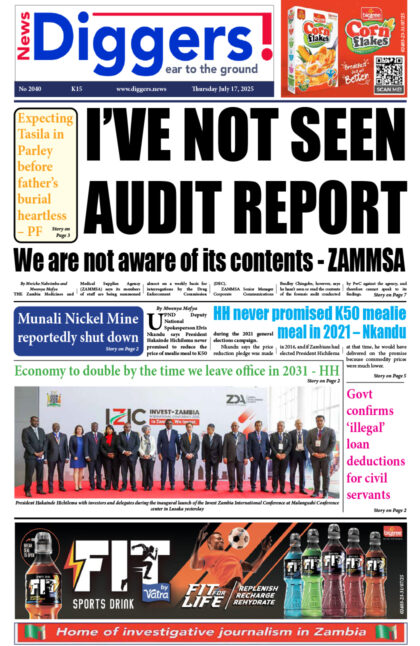What has largely determined the legacy of successive presidents of Zambia – except Kenneth Kaunda’s – is their attitude towards corruption.
Zambians love, trust, and respect a national leader who shows clear or demonstrable will to fight past and especially present corruption, to deal decisively with the corruption of their officials or associates including those in the inner circle. This is what sets Levy Patrick Mwanawasa apart.
As I stated yesterday on Diamond TV (for a recorded version of the programme, please click on this link: https://youtube.com/watch?v=XrPgZN4l5fE), Levy was so decisive when it came to fighting corruption that officials, including Cabinet ministers, accused of graft were dismissed long before the public complained and subsequently prosecuted. This is the leadership that President Hichilema should demonstrate if his crumbling fight against corruption is to be taken seriously.
As it stands, it would be fair to say that Hichilema’s anti-corruption fight is failing because he lacks the political will to fight corruption. This may be because the president is either involved in corrupt activities, is too close to some of his officials who are corrupt – thereby impairing his judgement and making it difficult for him to act against them – or is a captive of a network of both private and public actors who, for whatever reason, seem to be tightly holding his balls (figuratively speaking!). The situation is not helped by Hichilema’s tendency to listen to only those he likes. In other words, the president has shown a rigid unwillingness to listen to even reasonable advice, especially if that advice comes from people outside his inner circle or whom he thinks do not support him.
What a pity because Hichilema, following his historic election, had a golden opportunity to wage a genuine and faceless fight against corruption, unite citizens across ethnic and regional identities and coalesce their energies for nation building, restore Zambia’s democracy, resuscitate its economy, develop a culture of meritocracy especially in the civil service by appointing competent men and women to key formal institutions, and work towards building a truly functioning country that works for everyone. Sadly, Hichilema is steadily building a coalition of opposition against himself, largely emanating from how he has handled these key issues.
Once again, I appeal to President Hichilema to reassess his priorities, place public interest above personal relationships, change course for the better, and rescue his failing presidency. Or else, this African proverb shall come to pass: “A fly that does not heed advice gets buried with the corpse”.


















